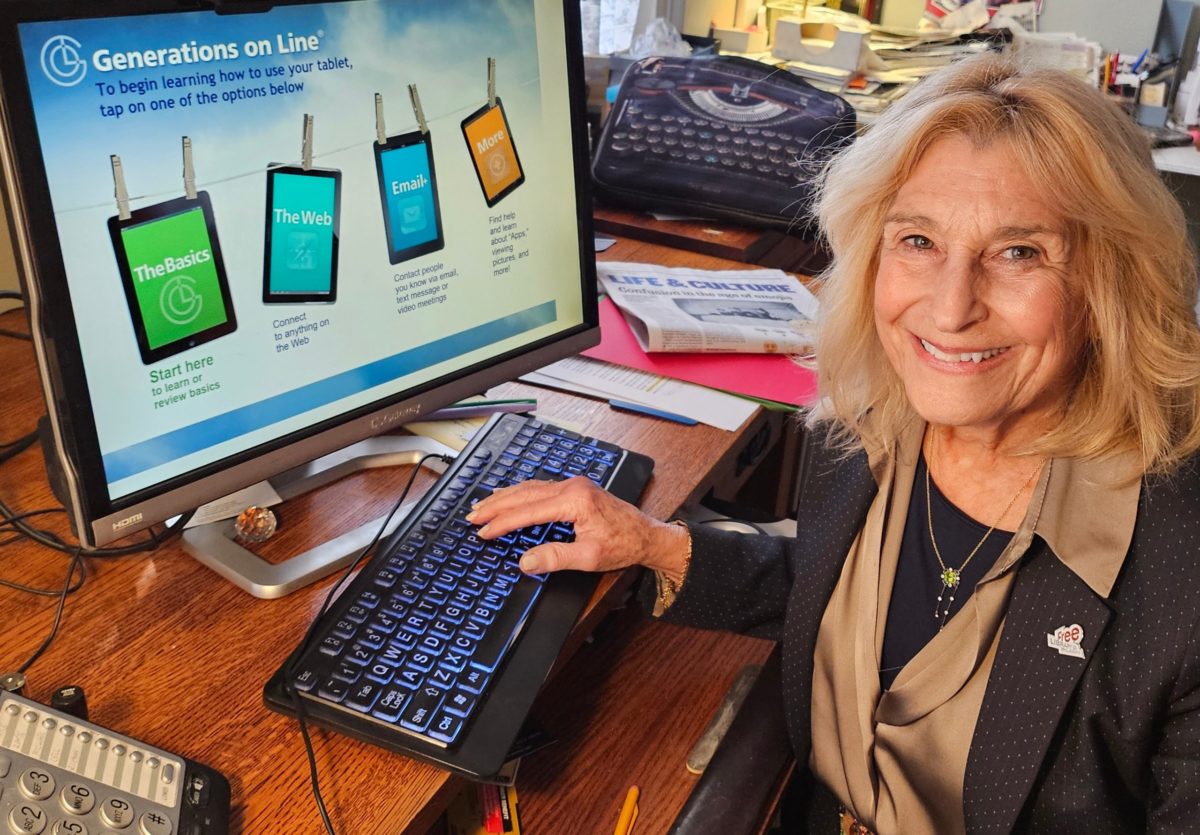Meet Generations on Line CEO & founder Tobey Dichter
By Mary Anna Rodabaugh
When Tobey Dichter was a child, she was asked to write an essay answering the question: What do you want to be when you grow up?
“I didn’t want to be a watermelon,” Dichter said. “A watermelon seed just grows to make more watermelons. I felt compelled to change the world.”
Today, in addition to serving on numerous boards, Dichter is the CEO and Founder of Generations on Line, a nonprofit organization that reduces isolation by providing easy, fast and free digital skills for older adults. The organization got its start in 1999 at eight locations throughout Philadelphia. Today Generations on Line is used internationally and in all 50 states.
The start of something big
In 1996, the internet started making its way into the mainstream. Around the same time, Dichter’s daughter was attending Tufts University. The school put on a presentation for parents about a new and amazing way to get deeper information and knowledge: the internet. That presentation captivated Dichter’s heart and curiosity. Her husband bought her VHS tapes that told the story of the internet.
“I read a quote from Peter Drucker, ‘the good thing about the internet is that it eliminates distance,’” Dichter said.
With a penchant for older adults, Dichter began to see what a remarkable resource the internet could be for older adults. At the time, only 14% of older adults 65 and above were on the internet. Dichter saw a chance to do something in the world where she could combine a solution with a known problem to make a change. She tapped into her corporate contacts, as well as her daughters’ networks, to find the best designers to help bridge the digital divide.
Time for a change
Ignited by excitement and passion for an impactful idea, Dichter quit her full-time corporate job. She gave up her corner office and took an early retirement. “I never looked back,” she said.
As Dichter made the huge transition from the corporate world to a brand-new nonprofit startup, she felt both exhilarated and frightened. She and her team navigated the complicated world of fundraising, product development, and competition. To gain traction in the nonprofit world, and to reach more participants, Dichter and her team launched a clinical trial of the program. They chose eight locations in Philadelphia, including an assisted living, two senior centers and a public library, to launch the prototype. Older adults sat at a large computer monitor encased in a frame. The frame contained friendly reminders on how to access the internet and use the mouse to navigate the computer. Dichter’s team collected feedback from participants to refine the program.
“I was insistent that I wanted to beat out AOL and introduce this new idea of older adults helping themselves,” Dichter said. She put out a press release and received a call from the Philadelphia Inquirer. The paper published a small paragraph on Dichter and her team’s efforts. A short time later, Dichter received a life-changing phone call. The founders of the Lenfest Institute, which supports sustainable business models for local journalism, wanted to learn more about the program.
Life-changing support
Gerry and Marguerite Lenfest were very impressed with Generations on Line. They asked Dichter and her team to disclose how much funding they would need to really make an impact.
“To this day, I credit Generations on Line to Gerry and Marguerite Lenfest,” Dichter said. “They believed in us.”
With funding secured, the team developed the software needed to scale, while offering the software at zero cost to organizations and individuals. Generations on Line received abundant testimonials including one from a 72-year-old Asian woman who said the program changed her life. Generations on Line allowed her to read Chinese news online while teaching herself English. Soon, organizations across the United States were requesting the same tools.
A huge impact
“When we get an unsolicited ‘oh my gosh, this changed my life’ email, it means more to us than the big numbers of more than 300,000 people we’ve helped,” says Dichter. “When a veteran can re-connect with an Army buddy, who he never thought he would find, or a woman who says, ‘my daughter would be so proud of me.’ These are the moments where we know we helped somebody out there.”
As Generations on Line looks toward the future, the team plans to pursue meeting basic internet needs. For example, the internet is now used for patient portals, Medicare registration and even bill payment. As technology advances and the internet becomes more of a necessity and less of a luxury, Generations on Line is dedicated to serving as that access point and education champion for older adults.
Generations on Line offers a Sip & Swipe Cafe program where volunteer teachers present digital literacy lessons alongside the Generations on Line software on tablets for participants. There are 46 Sip & Swipe Cafes, plus another 70 sites, in Philadelphia that have used Generations on Line to teach older adults about the internet.
The woman behind the team
“I really do think it takes a village,” Dichter said. “Our team, which has been together for more than 17 years, is my village, and then we reach out to the constituents to get input and gain understanding.”
Dichter and her husband reside in Center City Philadelphia and are deeply involved in the arts and civic institutions around the city. They love to travel and just returned from a trip to Doha. They have two children and two grandchildren.
For more information visit GenerationsOnLine.com or download the East Tablet Help for Seniors application on your smartphone or tablet.
Mary Anna Rodabaugh is a writer, editor and writing coach.




